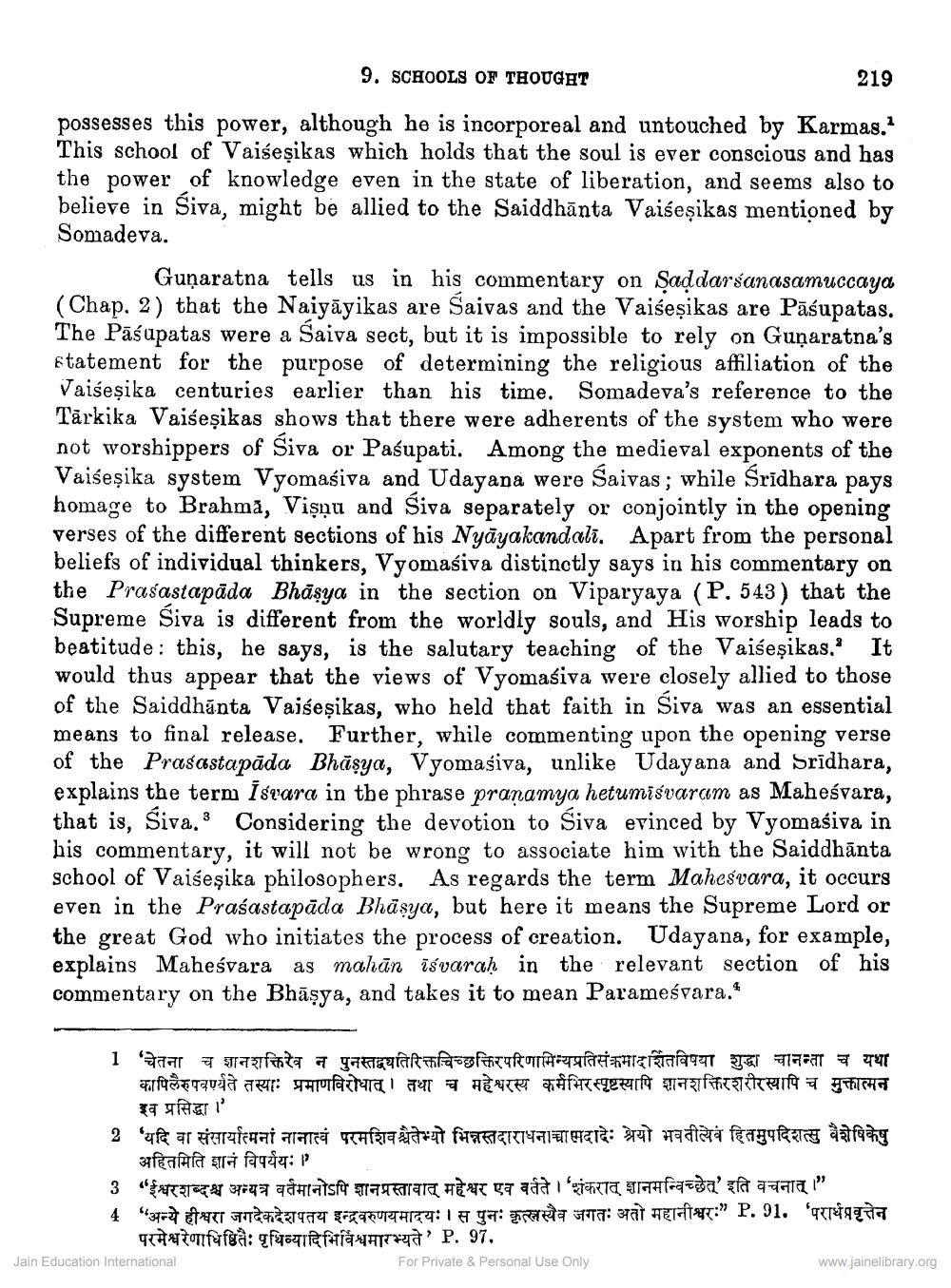________________
9. SCHOOLS OF THOUGHT
219
possesses this power, although he is incorporeal and untouched by Karmas. This school of Vaisesikas which holds that the soul is ever conscious and has the power of knowledge even in the state of liberation, and seems also to believe in Siva, might be allied to the Saiddhānta Vaiśeşikas mentioned by Somadeva.
Gunaratna tells us in his commentary on Saddarsanasamuccaya (Chap. 2) that the Naiyāyikas are Saivas and the Vaiseșikas are Pāśupatas. The Pāśupatas were a Saiva sect, but it is impossible to rely on Gunaratna's statement for the purpose of determining the religious affiliation of the Vaiseșika centuries earlier than his time. Somadeva's reference to the Tārkika Vaišeşikas shows that there were adherents of the system who were not worshippers of Siva or Pasupati. Among the medieval exponents of the Vaiseșika system Vyomaśiva and Udayana were Saivas; while Sridhara pays homage to Brahma, Vişņu and Siva separately or conjointly in the opening verses of the different sections of his Nyāyakandali. Apart from the personal beliefs of individual thinkers, Vyomasiva distinctly says in his commentary on the Prasastapāda Bhāşya in the section on Viparyaya (P. 543) that the Supreme Siva is different from the worldly souls, and His worship leads to beatitude: this, he says, is the salutary teaching of the Vaiseşikas.' It would thus appear that the views of Vyomasiva were closely allied to those of the Saiddhānta Vaisesikas, who held that faith in Siva was an essential means to final release. Further, while commenting upon the opening verse of the Prasastapāda Bhāsya, Vyomasiva, unlike Udayana and Sridhara, explains the term Isvara in the phrase pranamya hetumisvaram as Maheśvara, that is, Siva. Considering the devotion to Śiva evinced by Vyomaśiva in bis commentary, it will not be wrong to associate him with the Saiddhānta school of Vaiseşika philosophers. As regards the term Mahesvara, it occurs even in the Prasastapāda Bhāşya, but here it means the Supreme Lord or the great God who initiates the process of creation. Udayana, for example,
śvara as mahān isvarah in the relevant section of his commentary on the Bhāşya, and takes it to mean Parameśvara."
1 'चेतना च ज्ञानशक्तिरेव न पुनस्तद्वयतिरिक्तचिच्छक्तिरपरिणामिन्यप्रतिसंक्रमादर्शितविषया शुद्धा चानन्ता च यथा
कापिलैरुपवर्ण्यते तस्याः प्रमाणविरोधात् । तथा च महेश्वरस्य कर्मभिरस्पृष्टस्यापि झानशक्तिरशरीरस्यापि च मुक्तात्मन
इव प्रसिद्धा ।' 2 'यदि वा संसार्यात्मनां नानात्वं परमशिवश्चैतेभ्यो भिन्नस्तदाराधनाचापदादेः श्रेयो भवतीत्येवं हितमुपदिशत्सु वैशेषिकेषु
अहितमिति शानं विपर्ययः।। 3 "ईश्वरशब्दश्च अन्यत्र वर्तमानोऽपि ज्ञानप्रस्तावात् महेश्वर एव वर्तते । 'शंकरात् शानमन्विच्छेत्' इति वचनात् ।" 4 32 PT CAT SFF TOUTTARZY: 1 # 99: are a stat Herfst:" P. 91. qaraga
q orfafga: qfi fara afya' P. 97. Jain Education International For Private & Personal Use Only
www.jainelibrary.org




